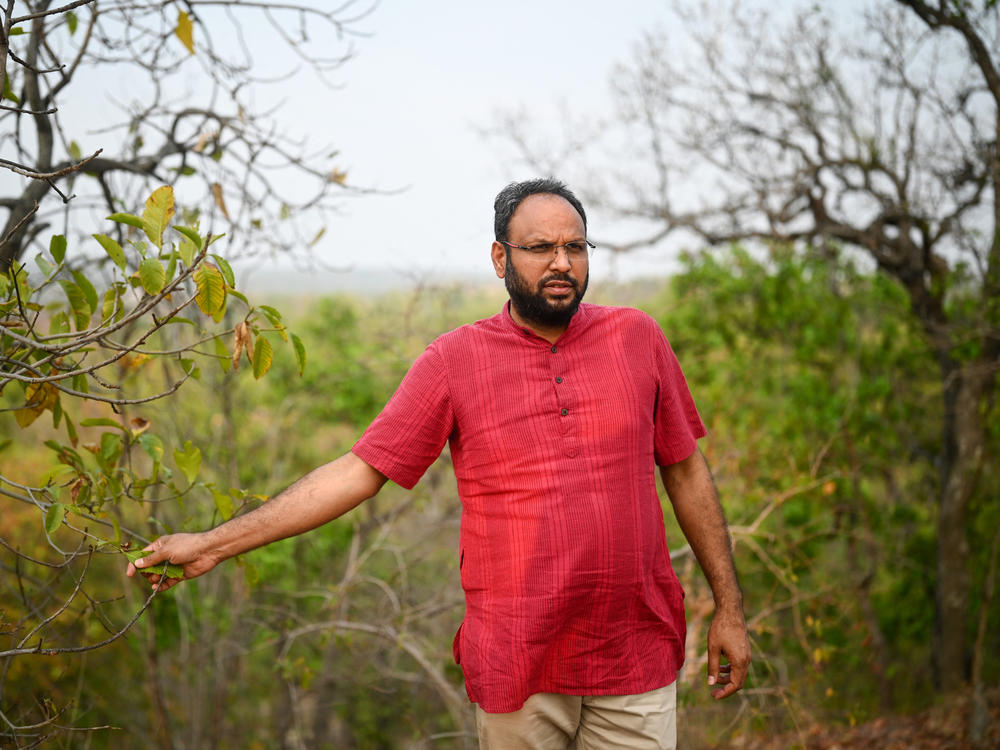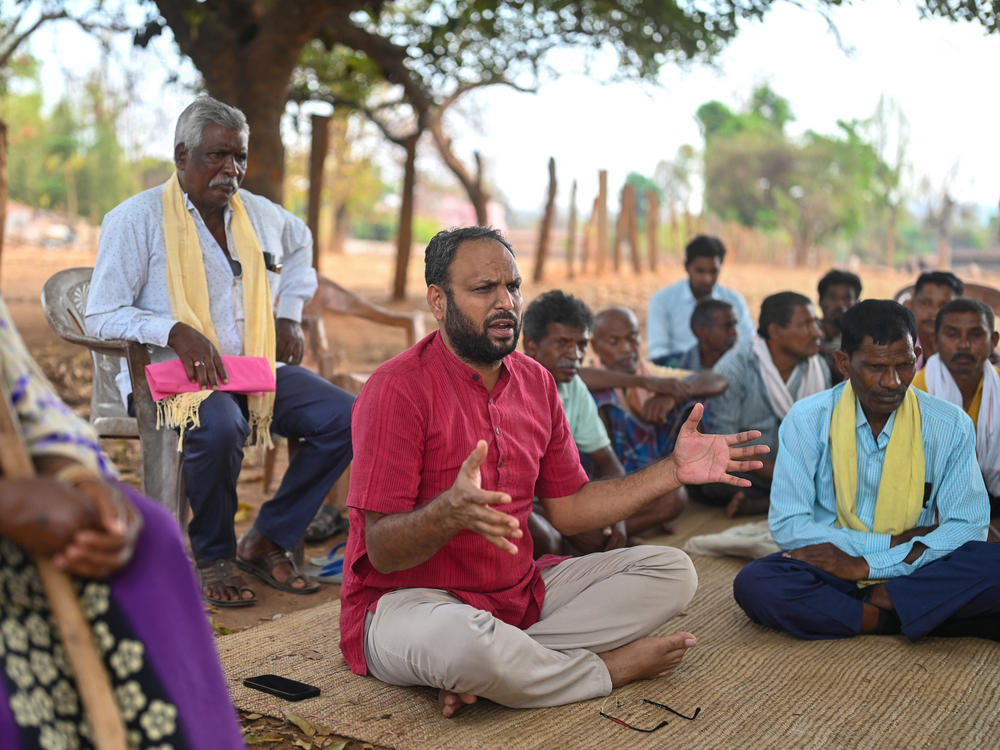Section Branding
Header Content
He frolicked in forests as a kid. Now he's saving them from a coal mine plan
Primary Content
Alok Shukla, the youngest of eight siblings, grew up in a village in Central India. He was a nature lover from a young age. It was just a short walk to streams where he could splash around and trees he could climb – although he needed his anxious parents' approval along with the company of a sibling.
As the years went by, he saw a change. Fields of crops like wheat and maize began encroaching on the thorny shrub jungles around farmlands in his village in the state of Madhya Pradesh. Over time, jackals and deer he once saw in these forests started vanishing as trees were cut to make way for the fields.
“The forest is magnetic, it draws you toward it,” says Shukla in a phone interview with NPR in the Indian language of Hindi. “And it used to hurt to see even a single tree being cut because there were many memories associated with it.”
Shukla’s childhood forest adventures fueled his determination as an adult to protect forests — as did his post-high school travels with his uncle in a neighboring state, when he first saw coal mines and the pollution they caused.
“Seeing the scary effects of all this industrialization got me thinking: What kind of progress are we really after if it means tearing down farms and forests?” says Shukla.
Shukla became an environmental activist and in 2011 confronted big mining companies planning to raze forests to mine coal. This month, 43-year-old Shukla was declared as one of the six winners of the 2024 Goldman Environmental award for his successes.
Michael Sutton, executive director of the San Francisco-based Goldman Environmental Foundation, in an email to NPR says Shukla stood out for his leadership efforts with indigenous communities. “He has built a broad and diverse coalition of Indians committed to defending nature and has unified leaders across the political and economic spectrums,” says Sutton.
It started with a river
Shukla’s official entry into the world of activism came after graduating from college in 2003 with degrees in botany and political science. He heard of protests over the selling of a stretch of the Sheonath river in Chhattisgarh to a private company – the first instance of river privatization in India. Locals could not use water from a section of the river, which was reserved for surrounding factories.
Shukla had never heard of a common natural resource like a river being privatized. He too joined demonstrations against it.
He also began working to protect the local rivers, a key source of water for farmers and tribal people, from industrial pollution, joining the local group River Valley Front.
As he traveled for his work, Shukla was frustrated by the scattered nature of environmental protests against river pollution as well as deforestation. He saw a need to unite these groups. So, in 2008 with the financial support of friends and family, he founded the Save Chhattisgarh Movement.
And then came coal
A few years later, in 2011, he stumbled upon another movement. When he traveled to the lush Hasdeo region, he learned that for nearly 3 years, Hasdeo’s 15,000 residents had been protesting to prevent coal mining in their forests.
In India 70% of electricity is powered by coal, with one fifth of that supply coming from coal mines in Chhattisgarh.
One of the mining companies involved had already started surveys of the Hasdeo forest area for developing a coal mine. There were 30 villages surrounding these forests that stretched over an area more than double the size of New York City. Shukla had been disheartened seeing the impact of pollution on rivers that he could not stop. Now, he found a new mission: Saving these untouched forests and its rivers from future coal mines.
Along with Save Chhattisgarh Movement activists from other parts of the state, he visited Hasdeo’s villages, explaining the rights of tribal and traditional forest communities to use forest resources for their livelihood, homes and cultural needs.
The Gond Adivasi women were his strongest allies. “The women were confident from day one,” says Shukla. “They were like, ‘How can they take away our forests just like that?’” While men in the community were small farmers growing rice and maize, the women depended heavily on these forests. They would be up at the crack of dawn to forage the woodlands for greens, mushrooms, fruits, seeds and herbs for their daily meals. They worshiped the hardwood timber Sal trees that towered over these forests.
But the government was taking steps to divvy up the region into 30 land parcels — or “coal blocks” as they are officially called – with a plan to sell them at auction. Shukla met with local communities around Hasdeo in 2011 to form an alliance of local governments called the Save Hasdeo Forest Resistance CommitteeFor more than a decade, Shukla helped the villagers plan marches, rallies and social media campaigns to halt the government's plans to auction off coal fields.
Despite the non-violent nature of the protests, his parents and friends were worried.
“So in Chhattisgarh there’s a saying that if you are fighting with corporates then you are risking your life,” says Shukla. “My friends would say, ‘How can you fight against such big companies? You won’t be able to save these forests.’ "
In 2021, a decade after the Hasdeo coalition was created, the patience of the locals reached a breaking point. The Chhattisgarh government started buying land for coal mines from the community. But it was unclear if local village governments actually gave consent for the transactions.
What's more, these purchases were made despite a report by the Indian Council of Forestry, Research and Education, a government research agency, signaling that the coal mines would break this contiguous forest that was home to tigers and elephants and also change the direction in which rivers flow.
In October that year, the villagers, upset by the government's actions, organized a widely reported 186-mile march to the state capital, Raipur. On a rainy morning, 500 villagers began their 10-day journey with a pickup truck carrying basic supplies.
“I tried to keep my hopes up even though I was worried that the chief minister could refuse to meet us,” says Shukla. “If we didn’t get any decision [through the march], the disappointment would destroy this movement.”
Upon reaching Raipur, the chief minister did meet them and announced the cancellation of 21 coal field leases in Hasdeo. A few months later, the chief minister of Chhattisgarh announced that the government had decided to pass a unanimous resolution demanding a ban on all coal block auctions in Hasdeo.
According to a transcript of the discussion in the legislature, then chief minister, Bhupesh Baghel, said that public sentiment had influenced this decision.
“Civil society movements like these are like safety release valves for the voice of marginalized people to get to the administration,” says Rajesh Thadani, a forest ecologist and researcher based in India. Shukla is thrilled that this peaceful movement of indigenous communities against large coal mining businesses has gained global recognition.
What's next?
Shukla’s organization still has work to do. They’re protesting the felling of trees in three coal blocks outside the forest.
“How can we just destroy this natural forest in search of coal?” he asks. “I’ve seen my own childhood memories being erased as jungles in my village disappeared. In Hasdeo too the locals’ identity is deeply connected to forests, and if this is destroyed they will have nothing left.”
Anupama Chandrasekaran is an audio and print journalist based in Chennai, Southern India. She has previously reported for Reuters out of New York City. Her work has also appeared in The New York Times, The Wall Street Journal, The BBC and Deutsche Welle. She works closely with community radio journalists in India. You can find her on X @indiantimbre


